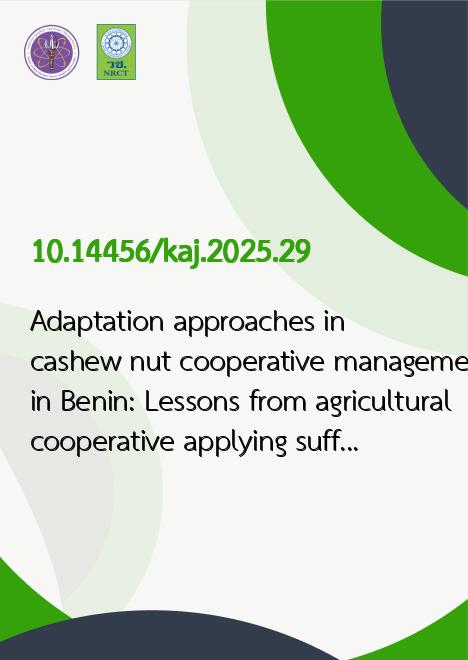
|
Adaptation approaches in cashew nut cooperative management in Benin: Lessons from agricultural cooperative applying sufficiency economy philosophy in Thailand |
|---|---|
| รหัสดีโอไอ | |
| Creator | Chutiwalanch Semmahasak |
| Title | Adaptation approaches in cashew nut cooperative management in Benin: Lessons from agricultural cooperative applying sufficiency economy philosophy in Thailand |
| Contributor | Naif Djarra, Manat Suwan, Watcharapong Wattanakul, Phattharawuth Somyana, Saiyud Moolphate, Choosit Choochat |
| Publisher | Faculty of Agriculture |
| Publication Year | 2568 |
| Journal Title | Khon Kaen Agriculture Journal |
| Journal Vol. | 53 |
| Journal No. | 2 |
| Page no. | 405-415 |
| Keyword | cashew nut, agricultural cooperative, adaptation approaches, Thailand, Benin |
| URL Website | https://li01.tci-thaijo.org/index.php/agkasetkaj |
| Website title | Khon Kaen Agriculture Journal |
| ISSN | 3027-6497 (Online) |
| Abstract | This study explored adaptation strategies for cashew nut cooperatives in Djougou, Benin, using Thailand’s Sufficiency Economy Philosophy (SEP) as a model, drawing insights from the cooperative in Tha Pla, Uttaradit, Thailand. Data from each cooperative were collected from five groups, with a total of 30 farmers in each cooperative. Questionnaires, surveys, and interviews focused on socio-demographic factors, cooperative structures, resource management, and the impact of SEP principles. Quantitative analysis revealed significant differences: the cooperative in Tha Pla, Uttaradit, comprising 90.00% women over the age of 50, demonstrated higher levels of education (100.00%) and income sufficiency (63.33%), alongside higher productivity (>400 kg/ha). In contrast, the Beninese cooperative, primarily male-led (86.70%) with a younger membership (70.00% between 31-50 years), showed lower education levels (66.67% illiteracy), income sufficiency (6.67%), and lower productivity (<400 kg/ha). The Thai cooperative demonstrated stronger management practices, achieving maximum scores of 16.00 in both material and financial management (16.00 vs. 12.00) and member services (16.00 vs. 11.00), highlighting more effective organizational functioning in Thailand. The overall satisfaction score of the cooperative services in Thailand was significantly higher than in Benin (3.71 ± 0.50 vs. 3.10 ± 0.30; t-test 16.18, P < 0.01). Addressing gaps in gender inclusivity, service provision, resource management, community development, and governance through SEP-driven strategies could significantly enhance the effectiveness and sustainability of Beninese cooperatives, following Thailand’s model. Given SEP’s success in Thailand, this study suggested that Benin consider adapting SEP principles or developing a similar framework to address these persistent challenges. |
